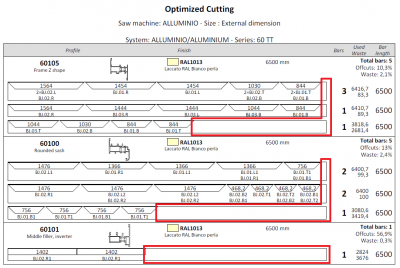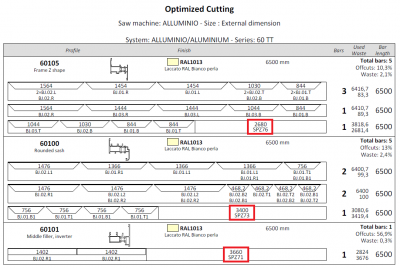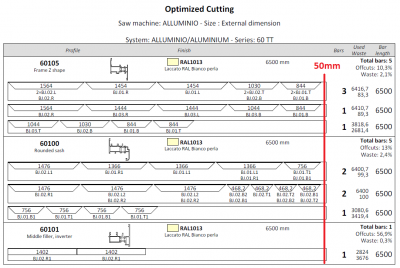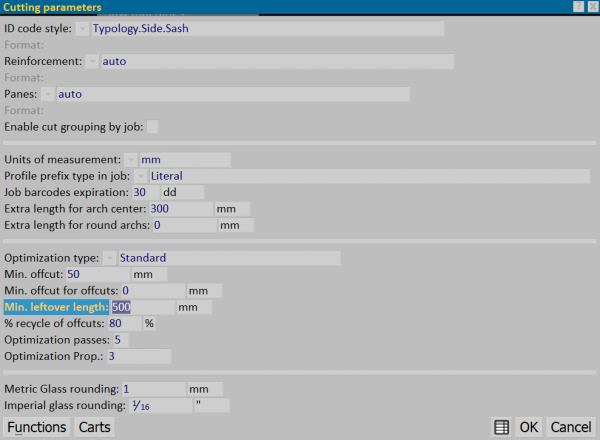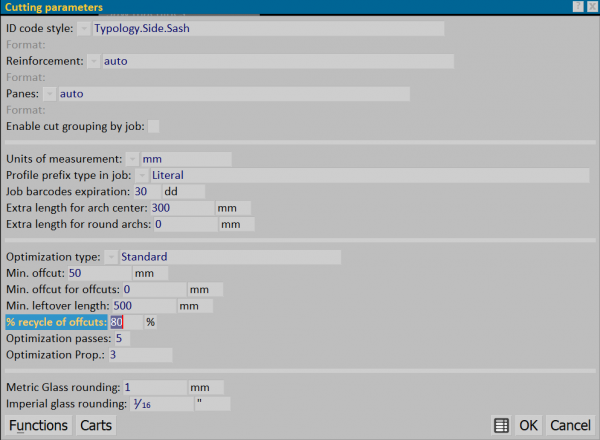Waste management: % recycle of offcuts
From Opera Wiki
(Difference between revisions)
Monica.Sanna (Talk | contribs) |
Monica.Sanna (Talk | contribs) |
||
| Line 2: | Line 2: | ||
{{BR}} | {{BR}} | ||
[[Image:slidescarto.png|thumb|right|400px]] | [[Image:slidescarto.png|thumb|right|400px]] | ||
| - | {{NB|In order to introduce the management of the waste it is opportune to clarify some basic concepts: we define '''WASTE''' the part of advanced profile in phase of cut.}}{{BR}} | + | {{NB|In order to introduce the management of the waste it is opportune to clarify some basic concepts: we define '''WASTE''' the part of advanced profile in phase of cut.}} |
| + | {{BR}} | ||
[[Image:slidespezzone.png|thumb|right|400px]] | [[Image:slidespezzone.png|thumb|right|400px]] | ||
| - | {{NB|In Opera Job Management, the waste can be reused (and it is called '''OFFCUTS''') or it will be lost. The reuse of the pieces is linked to the cutting settings defined in the program: for example, by establishing a minimum cut size of 500 mm, during the optimization phase the program will take into account the larger parts of that measure.}}{{BR}} | + | {{NB|In Opera Job Management, the waste can be reused (and it is called '''OFFCUTS''') or it will be lost. The reuse of the pieces is linked to the cutting settings defined in the program: for example, by establishing a minimum cut size of 500 mm, during the optimization phase the program will take into account the larger parts of that measure.}} |
| + | {{BR}} | ||
[[Image:slidesfrido.png|thumb|right|400px]] | [[Image:slidesfrido.png|thumb|right|400px]] | ||
| - | {{NB |Another important concept concerns the definition of ''WASTE': in Opera Job Management defines the part of profile or piece that will not be considered for the purpose of cutting optimization. By setting a minimum offcut to 50 mm, the optimization will be performed considering that from the length of the profile in question should be excluded 50 mm.}}{{BR}} | + | {{NB| Another important concept concerns the definition of ''WASTE'': in Opera Job Management defines the part of profile or piece that will not be considered for the purpose of cutting optimization. By setting a minimum offcut to 50 mm, the optimization will be performed considering that from the length of the profile in question should be excluded 50 mm.}} |
| + | {{BR}} | ||
| - | '''% recycle of offcuts''': the new section is important for the calculation of | + | '''% recycle of offcuts''': the new section is important for the calculation of job costs, because it allows you to set the percentage of reusable waste that you plan to use on average for your production. The programme will use this percentage in two circumstances: |
| - | * in the | + | * in the job material analysis, to estimate the amount of discarded profiles, evaluating their impact on the total cost of the same. |
* in the cutting optimization, instead, the evaluation will be made in percentage on the length of the profiles, per single bar. | * in the cutting optimization, instead, the evaluation will be made in percentage on the length of the profiles, per single bar. | ||
| Line 15: | Line 18: | ||
== Process == | == Process == | ||
| - | First of all, it is necessary to indicate in Opera what is the size of a bar considered ''usable'' ('''Minimum | + | First of all, it is necessary to indicate in Opera what is the size of a bar considered ''usable'' ('''Minimum offcut'''). |
{{BR}} | {{BR}} | ||
This parameter can be set by going to the menu ''Workshop > Cutting'''. | This parameter can be set by going to the menu ''Workshop > Cutting'''. | ||
| - | [[Image: | + | [[Image:spezzoneminimo_.png|600px]] |
| - | In the section '''% | + | In the section '''% recycle of offcuts''', please indicate the percentage of pieces that are expected to be reusable. |
| - | [[Image: | + | [[Image:per_utilizzo_spezzoni_.png|600px]] |
Revision as of 12:52, 7 July 2022
% recycle of offcuts: the new section is important for the calculation of job costs, because it allows you to set the percentage of reusable waste that you plan to use on average for your production. The programme will use this percentage in two circumstances:
- in the job material analysis, to estimate the amount of discarded profiles, evaluating their impact on the total cost of the same.
- in the cutting optimization, instead, the evaluation will be made in percentage on the length of the profiles, per single bar.
Process
First of all, it is necessary to indicate in Opera what is the size of a bar considered usable (Minimum offcut).
This parameter can be set by going to the menu Workshop > Cutting'.
In the section % recycle of offcuts, please indicate the percentage of pieces that are expected to be reusable.

